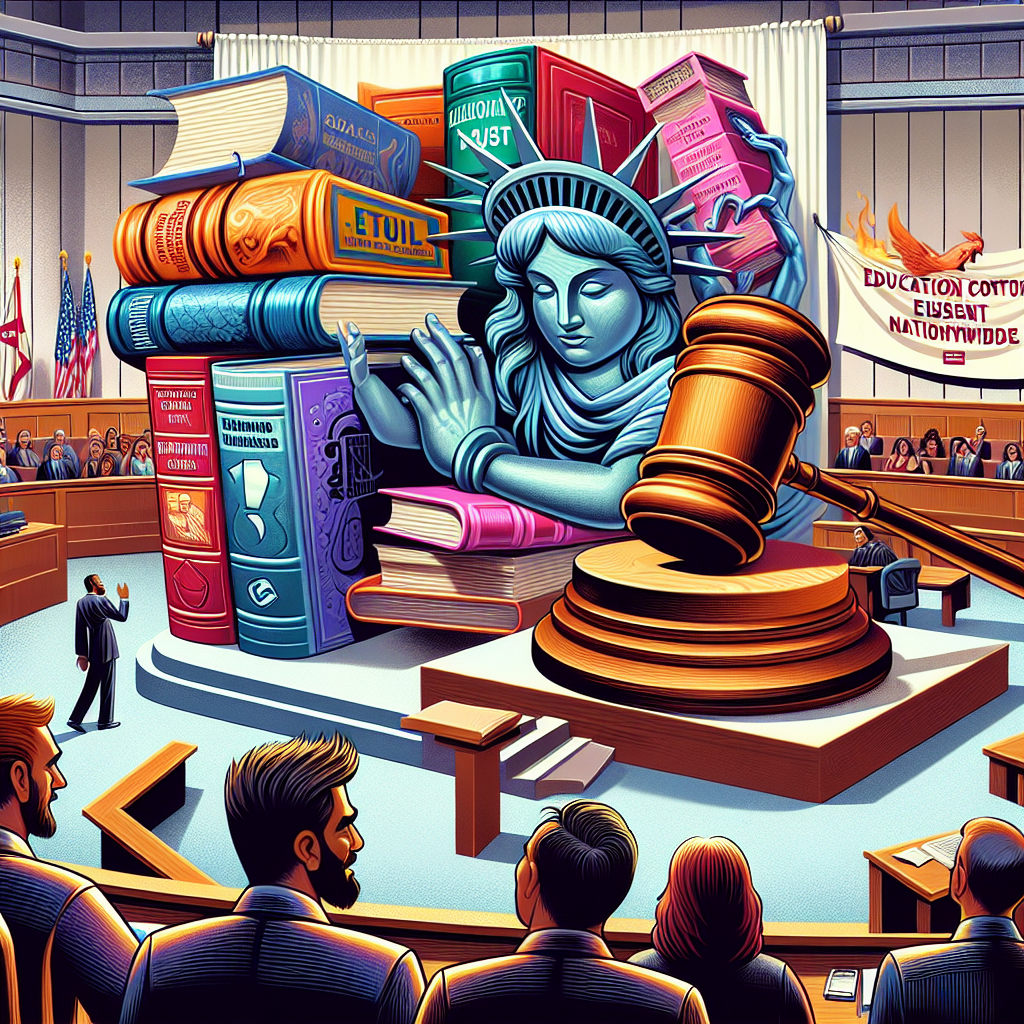
Florida Faces Legal Heat: Nation’s Top Publishers Take Stand Against Content Restriction Laws
Lawmakers in Florida are once again thrust into the national spotlight as heavyweights in the publishing industry have united to file a suit over controversial content restrictions in educational settings. The lawsuit, spearheaded by the country's largest publishing houses, is scrutinizing the ramifications of legislation they argue stifles free speech and academic freedom.
Background: The Genesis of the Controversy
In May 2023, Florida Governor Ron DeSantis signed into law several measures aimed at regulating content in educational materials, particularly those used in public K-12 schools. The laws mandate rigorous reviews of educational content, focusing on issues like sexual orientation, gender identity, race relations, and America's founding principles.
Critics have labeled these laws as a form of censorship designed to suppress discussions on critical contemporary issues. They argue the measures are part of a broader agenda to mold educational content to fit a narrowly defined ideological perspective. On the other side, proponents applaud the laws for ensuring that educational content aligns with what they describe as the core values and traditional principles upon which America was founded.
Legal Showdown: The Books and Brains Behind the Lawsuit
The lawsuit, filed in a federal court last week, sets the stage for a legal battle that has far-reaching implications for educational content nationwide. Major players in the publishing industry, including Pearson, Scholastic, Houghton Mifflin Harcourt, and others, are the driving forces behind this legal challenge. Their collective muscle represents a formidable opposition to the state's legislative maneuvers.
According to the plaintiffs, the law infringes upon First Amendment rights, which protect free speech and freedom of the press. They claim that the stringent content reviews have created a chilling effect, causing publishers to self-censor and avoid topics that could trigger punitive responses from state regulators.
"The real issue at stake is the intellectual freedom of students and educators," said John Fallon, CEO of Pearson. "This law not only restricts the content that students can access but also limits the ability of educators to provide a robust and comprehensive education."
The State’s Stand: Defending the New Regulations
The state of Florida, however, remains steadfast in its defense of the legislation. State officials assert that the laws were enacted to safeguard students from what they term "inappropriate" and "biased" educational materials. Governor DeSantis has repeatedly emphasized that the measures are part of a broader effort to promote parental rights and ensure that education remains free from "woke indoctrination."
"Parents have the right to know what their children are being taught," a spokesperson for the Governor’s office explained. "These laws create a transparent process by which stakeholders can ensure that educational content is appropriate and aligned with community standards."
The Classroom Impact: A Closer Look at Changes
The impact of these laws on classrooms across Florida has been profound. Teachers are now caught in the crossfire, often having to navigate complex bureaucratic processes to get their materials approved. Many educators report spending unprecedented amounts of time on compliance activities, diverting attention from instructional planning and delivery.
"I feel like I'm walking on eggshells," said Sarah Mitchell, a high school history teacher in Miami. "Every lesson plan has to be meticulously reviewed and often altered to avoid triggering a review. It’s exhausting and distracts from the real goal of educating students."
Students, too, are feeling the effects. Some report a notable shift in the range of topics discussed in class. Subjects that were once openly debated are increasingly becoming taboo.
"We used to have vibrant discussions about all sorts of social issues," said Mia Rodriguez, a senior at a Tallahassee high school. "Now, those conversations are rare. Teachers are scared to bring up anything controversial."
National Repercussions: Echoes Beyond Florida
The legal battle in Florida is resonating far beyond state borders. As educational institutions grapple with the complexities of these laws, other states are watching closely. Some are considering similar legislation, while others are preparing for the legal implications should the publishers win their suit.
Education policy experts believe that this case could set a significant precedent. “The outcome of this lawsuit has the potential to reshape the landscape of educational content across the United States,” noted Dr. Laura Jackson, an education policy analyst at the Brookings Institution. "If the publishers prevail, it could stall similar legislative efforts in other states. If the state wins, however, it could embolden more states to pursue restrictive content laws."
The Authors’ Perspective: Voices from the Creators
Authors, whose works are at the center of the controversy, have also voiced their concerns. Many feel that their creative and intellectual freedoms are being undermined by these sweeping regulations.
"I write to provoke thought and inspire critical analysis," said author Jason Reynolds, whose works often tackle issues like race and social justice. "When laws begin to dictate what can and cannot be discussed, it diminishes the capacity for books to serve as catalysts for discussion and change."
Renowned children’s author Judy Blume echoed similar sentiments. "Books should be a safe place for children to explore difficult questions and understand the world around them. Censorship stifles that opportunity and does a disservice to young readers."
The Federal Court Arena: Stakes and Speculation
As the case proceeds to court, both sides are bracing for a protracted legal battle. The stakes are high, and the outcome remains uncertain. Legal experts anticipate that the case could very well end up before the U.S. Supreme Court, given the wide-reaching implications of the First Amendment questions it raises.
In the meantime, the educational landscape in Florida remains in a state of flux. Schools, teachers, and students are all trying to navigate the evolving terrain, with the lawsuit adding yet another layer of complexity.
Ultimately, this case is about more than just textbooks and classroom materials. It is about the fundamental principles of free speech and intellectual freedom in American education. As the courtroom drama unfolds, its reverberations will likely shape the contours of this ongoing cultural and ideological battle.
For now, all eyes are on Florida and the federal court that will decide the fate of this pivotal legal challenge. Whether these laws will be deemed a necessary safeguard or an unconstitutional overreach remains to be seen, but the debate over educational content is far from over.



